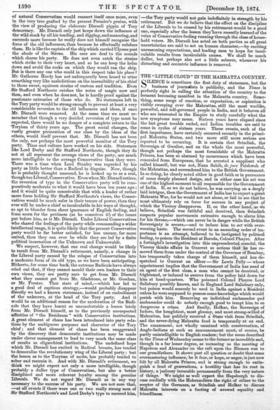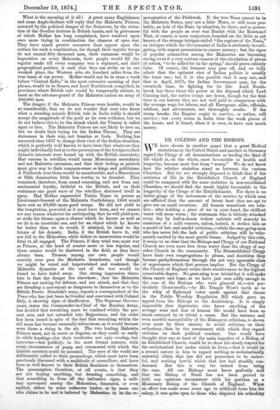THE "LITTLE CLOUD " IN THE MAHRATTA COUNTRY.
SILENCE is sometimes the first duty of statesmen, but the business of journalists is publicity, and the Times is perfectly right in calling the attention of the country to the ferment becoming manifest in the Mahratta country. Some- thing, some surge of emotion, or expectation, or aspiration is visibly sweeping over the Mahrattas, still the most warlike, powerful, and self-governed people in India, and it behoves all who are interested in the Empire to study carefully what the new symptoms may mean. Sixteen years have elapsed since the last great trouble ended, and Indian troubles are said to come in cycles of sixteen years. Three events, each of the first importance, have certainly occurred recently in the princi- pal Mahratta States, and two more still more serious are reported to be occurring. It is certain that Scindiah, the Sovereign of Gwalior, and on the whole the most powerful, though not perhaps the most formidable of the Mahratta Princes, has been so alarmed by occurrences which have been concealed from Europeans, that he arrested a suppliant who called himself, but was not, Nana Sahib, de jure Peishwal of the Mahrattas, and surrendered him to the British Government. In so doing, he clearly acted either in good faith or in pursuance of some deeply planned design, and in either case his act was one of the highest moment to all responsible for the Government of India. If, as we do not believe, he was carrying on a deeply laid intrigue, then the Government of India has to expect a great Mahratta War, for he would not act alone, or fail to see that he must ultimately rely on force for success in any project of which the Viceroy disapproves. If, on the other hand, as vie believe, Scindiah was faithful and deceived, then Scindiah suspects popular movements extensive enough to alarm him for his throne,—which can never be in danger while the British Sovereignty is secure,—and to induce him to act with over- weening haste. The second event in an ascending order of im- portance is an attempt, believed to be instigated by political feeling, to poison the Resident at Baroda, Colonel Phayre. After a fortnight's investigation into this unprecedented scandal, the Viceroy thinks affairs in Guzerat so serious that he has re- moved them from under the control of the Governor of Bombay, has temporarily taken charge of them himself, and has de- spatched to Guzerat an officer — Sir Lewis Pelly — whose appointment implies that the Government of India has need of an agent of the first class, a man who cannot be deceived, or frightened, or induced to swerve from the policy laid down for him at head-quarters. Who poisoned Colonel Phayre Lord Salisbury possibly knows, and in England Lord Salisbury only, but poison would scarcely be used in India against a Resident unless he were supposed to possess some knowledge which would perish with him. Removing an individual ambassador qud ambassador could do nobody enough good to tempt him to so dangerous a crime. And finally, Holkar, the Sovereign of Indore, the haughtiest, most gloomy, and most strong-willed of Mahrattas, has publicly received a State visit from Scindiah, and the never-dying Mahratta feud is temporarily at an end. The amazement, not wholly unmixed with consternation, of Anglo-Indians at such an announcement must, of course, be partly unintelligible to English readers; but the scene described in the Times of Wednesday seems to the former as incredible and, though in a far lesser degree, as menacing as the meeting of Napoleon and Alexander on the raft upon the Niemen was to our grandfathers. It shows past all question or doubt that some overmastering influence, be it fear, or hope, or anger, is just now felt by all Mahratta Princes, and is strong enough to extin- guish a feud of generations, a hostility that has its root in history, a jealousy incurable permanently from the very nature of things. We might as well expect the Hapsburgh to dis- cuss cordially with the Hohenzollern the right of either to the sceptre of the Germans, as Scindiah and Holkar to discuss Mahratta interests on a footing of avowed equality and friendliness.
What is the meaning of it all ? A great many Englishmen and some Anglo-Indians will reply that the Mahratta Princes, annoyed by the political danger of the Guicowar, by the reten- tion of the Gwalior fortress in British hands, and by grievances of which Holkar has long complained, have resolved upon once more trying in combination the chances of open war. They have much greater resources than appear upon the surface for such a combination, for though their regular troops do not exceed fifty thousand men, their summons would be imperative on every Mahratta, their people would fill the regular ranks till every company was a regiment, and their geographical position is such that they can strike us in our weakest place, the Western side, six hundred miles from the true bases of our power. Holkar would not be in arms a week before "Central India," in the most extensive meaning of that phrase, would be in flames, and Lord Northbrook compelled, in provinces where British rule would be temporarily extinct, to meet as the advance-guard of the Mahratta nation an army of 100,000 men.
The danger, if the Mahratta Princes were hostile, would be so considerable, that we do not wonder that men who know what a standing miracle British rule in India really is should accept the magnitude of the peril as its own evidence, but we do not believe this to be the attack which the Viceroy is called upon to face. The Mahratta Princes are not likely to love us, but we doubt their trying for the Indian Throne. They are statesmen in their way, not fanatics or fools. Nothing has occurred since 1857 to change their view of the Indian situation, which is perfectly well known to have been that whatever they might individually feel as to the pretensions of the foreigner, their dynastic interests were bound up with the British suzerainty, that success in rebellion would mean Mussulman ascendancy and not Mahratta extension, and that their feeling as patriots must give way to their common-sense as kings and politicians. A Peishwah over them would be unendurable, and a Mussulman or Sikh domination little less worthy to be dreaded. They remained, therefore, from sound reasoning, and not from any sentimental loyalty, faithful to the British, and on their resistance one great wave of the rebellion shattered itself in spray. Had Holkar superseded Tantia Topee in person as Lieutenant-General of • the Mahratta Confederacy, 1858 would have cost us 20,000 more good troops. He did not yield to the temptation, powerful as it must have been, and we cannot see any reason whatever for anticipating that he will yield now, or stake his throne upon a chance which he knows as well as we do is an uncertain one, and for an object which he knows far better than we do would, if attained, be fatal to the future of his dynasty. India, if the British leave it, will not fall to the Mahrattas, while defeat in insurrection would be fatal to all engaged. The Princes, if they tried war, must war as Princes, at the head of armies more or less regular, and those armies would be shattered in the field, as they have always been. Treason among our own people would scarcely over pass the Marhatta boundaries, and though we might be vexed and impoverished and weakened, the Mahratta dynasties at the end of the war would be found to have faded away. Our strong impression there- fore is that the danger lies elsewhere ; that the Mahratta Princes are uniting for defence, and not attack, and that they are dreading a movement as dangerous to themselves as to the British Power. Scindiah's army, reports a correspondent of the Times who has just been in Gwalior and conversed with Colonel Daly, is showing signs of disaffection. The Supreme Govern- ment, states the Commander-in-Chief of the Bombay Army, has decided that recruiting must be confined within the pre- sent area and not extended into Rajpootana, and his order has been issued in spite of the fact that recruiting within the old areas has become unusually infructuous, as it would become were there a rising in the air. The two leading Mahratta Princes meet, not in secret or disguise, as they could so easily do while hunting—for their territories not only overlap, but intervene—but publicly, in the most formal manner, with every circumstance of pomp and ceremonial with which the historic occasion could be invested. The eyes of the world are deliberately called to their proceedings, which must have been previously discussed with a multitude of councillors, and have been as well known to their British Residents as themselves. The presumption therefore, at all events, is that they are not hoping anything, but dreading something, and that something is, from all the indicative signs, a mili- tary movement among the Mahmttas, fomented, or even excited, either by some unknown leader, or by some one who claims to be and is believed by Mahrattas to be the re- presentative of the Peishwah. If the true Nana cannot be in the Mahratta States, may not a false Nana, or still more pro- bably, an heir of the Nana by adoption, be there, and as power- ful with the people as ever was Dmitri with the Russians? That, of course, is more conjecture, founded on the little as yet known of the strange intrigue styled "the capture of the Nana," an intrigue which the Government of India is obviously investi- gating, with urgent precautions to ensure secrecy; but the signs of popular commotion among the Mahrattas are becoming strong, even if a very curious rumour of the circulation of pieces of cotton, "to be called for in the spring," should prove entirely false. Of course, the ferment may pass off, and we fully admit that the optimist view of Indian politics is usually the truer one ; but it is also possible that it may not, and that in April, 1875, the Indian Government may, for the twentieth time, be fighting for its life. Lord North- brook has three times the power at his disposal which Lord. Canning had, the native troops are fewer, though for the first time in our history they are not well paid in comparison with the average wage for labour, and all Europeans alike, officials, soldiers, and adventurers, are thoroughly awake. If the storm breaks, the Empire ought to survive, or rather, will survive ; but every storm in India tries the weak places of the house, and is found, when it is over, to have cost much money.







































 Previous page
Previous page